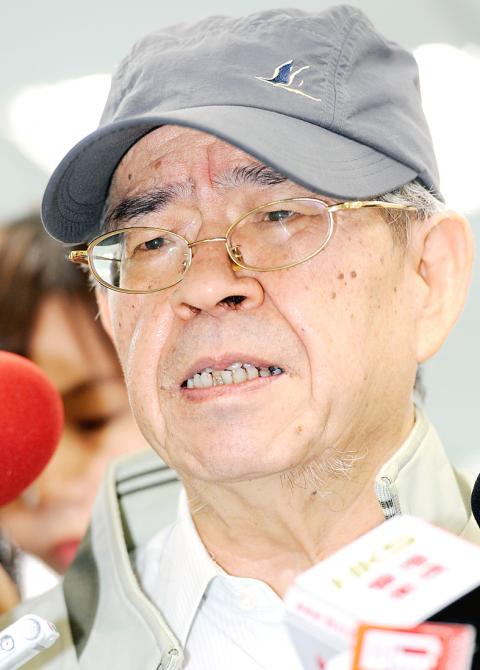Political analysts and Democratic Progressive Party (DPP) politicians yesterday criticized President Ma Ying-jeou (馬英九) for describing cross-strait relations as not international and cross-strait flights as domestic flights.
“What Ma has been doing in the past five years, in terms of external relations, is lying. He lied to the Taiwanese, the US and Beijing, hoping to reap benefits and personal gains,” political commentator Nan Fang Shuo (南方朔) said on the sidelines of a DPP-organized forum in Taipei.
At the Chinese Nationalist Party’s (KMT) weekly Central Standing Committee meeting on Wednesday, Ma, noting that domestic flights in the US have been more profitable than international flights, said that Taiwan’s airline companies would not have been profitable if they were not operating cross-strait routes.

Photo: Lo Pei-der, Taipei Times
“The relations between Taiwan and China are exactly like that,” Ma was quoted as saying.
His comment was interpreted to mean that cross-strait flights are domestic flights.
Ma also drew fire with his Double Ten National Day speech on Oct. 10 when he said the cross-strait relations were not international relations.
The Ma administration’s handling of diplomatic affairs has failed to maximize Taiwan’s gain and minimize potential damages, Nan Fang Shou said, adding that Ma assumed his deceit would win him an opportunity to meet Chinese President Xi Jinping (習近平) at next year’s APEC summit in Beijing.
Asked if Ma’s recent comments underlined the necessity for a constitutional amendment, Nan Fang Shuo said that the true problem did not lie in the Constitution, but in the way Ma and the KMT distorted the Constitution.
“If someone could distort the Constitution like that, amending the Constitution would not be meaningful,” he said.
Meanwhile, Ma yesterday tried to dismiss concerns about his defining cross-strait ties as “not international relations.”
“The Republic of China [ROC] is a sovereign country, and mainland China is part of our territory according to the Constitution. Therefore, our relations with the mainland are not international relations. It is a special relationship,” he said at a meeting with a US delegation led by Wyoming Governor Matt Mead at the Presidential Office.
The president also reiterated his “three noes” policy of no unification, no independence and no use of force in handling cross-strait relations, and said that the government continued to promote cross-strait development under the so-called “1992 consensus.”
He said that cross-strait air routes are neither international flights nor domestic ones, shrugging off concerns about his comparison of US domestic flights to cross-strait flights.
“We’ve defined that the cross-strait air routes are not international ones or domestic ones. They are special flights,” he said.
“Such a definition allows the two sides of the Taiwan Strait to enhance their relations and bring profits to the people from both sides that they did not enjoy in the past,” he said.
Ma cited the signing of the Economic Cooperation Framework Agreement (ECFA) and the service trade agreement, and said the cross-strait relations are the most peaceful and stable they have been in the past 60 years.
He also said the nation will continue to seek cooperation with the US in maintaining a sustainable defense force to protect public safety.

Auckland rang in 2026 with a downtown fireworks display launched from New Zealand’s tallest structure, Sky Tower, making it the first major city to greet the new year at a celebration dampened by rain, while crowds in Taipei braved the elements to watch Taipei 101’s display. South Pacific countries are the first to bid farewell to 2025. Clocks struck midnight in Auckland, with a population of 1.7 million, 18 hours before the famous ball was to drop in New York’s Times Square. The five-minute display involved 3,500 fireworks launched from the 240m Sky Tower. Smaller community events were canceled across New Zealand’s

The Ministry of Foreign Affairs (MOFA) yesterday said it is closely monitoring developments in Venezuela, and would continue to cooperate with democratic allies and work together for regional and global security, stability, and prosperity. The remarks came after the US on Saturday launched a series of airstrikes in Venezuela and kidnapped Venezuelan President Nicolas Maduro, who was later flown to New York along with his wife. The pair face US charges related to drug trafficking and alleged cooperation with gangs designated as terrorist organizations. Maduro has denied the allegations. The ministry said that it is closely monitoring the political and economic situation

‘SLICING METHOD’: In the event of a blockade, the China Coast Guard would intercept Taiwanese ships while its navy would seek to deter foreign intervention China’s military drills around Taiwan this week signaled potential strategies to cut the nation off from energy supplies and foreign military assistance, a US think tank report said. The Chinese People’s Liberation Army (PLA) conducted what it called “Justice Mission 2025” exercises from Monday to Tuesday in five maritime zones and airspace around Taiwan, calling them a warning to “Taiwanese independence” forces. In a report released on Wednesday, the Institute for the Study of War said the exercises effectively simulated blocking shipping routes to major port cities, including Kaohsiung, Keelung and Hualien. Taiwan would be highly vulnerable under such a blockade, because it

UNRELENTING: China attempted cyberattacks on Taiwan’s critical infrastructure 2.63 million times per day last year, up from 1.23 million in 2023, the NSB said China’s cyberarmy has long engaged in cyberattacks against Taiwan’s critical infrastructure, employing diverse and evolving tactics, the National Security Bureau (NSB) said yesterday, adding that cyberattacks on critical energy infrastructure last year increased 10-fold compared with the previous year. The NSB yesterday released a report titled Analysis on China’s Cyber Threats to Taiwan’s Critical Infrastructure in 2025, outlining the number of cyberattacks, major tactics and hacker groups. Taiwan’s national intelligence community identified a large number of cybersecurity incidents last year, the bureau said in a statement. China’s cyberarmy last year launched an average of 2.63 million intrusion attempts per day targeting Taiwan’s critical